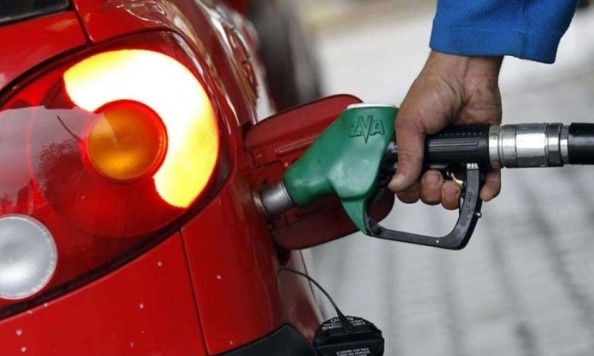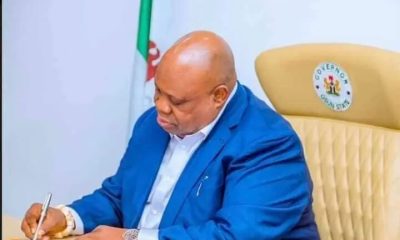Business
FG Speaks On Return Of Fuel Subsidy, Shutting Down Of Petrol Stations

The Federal Government, on Monday, denied reintroducing the subsidy on Premium Motor Spirit, popularly called petrol, amid the closure of many filling stations nationwide due to various challenges in the downstream oil sector.
It also said the pockets of queues observed by motorists in petrol stations across the country stemmed from hiccups in product distribution from the South to the North, not a lack of supply.
This came as the Nigerian National Petroleum Company Limited also declared on Monday that it would have gone bankrupt in June this year had it been the President, Bola Tinubu, did not halt subsidy on PMS in May.
PROMOTED CONTENT
NNPCL also announced that Nigeria would become a net exporter of refined petroleum products by next year, going by efforts to revamp its refineries.
Nigeria, through the NNPCL, currently imports PMS and other refined petroleum products consumed across the country, which has been ongoing for decades.
The Group Chief Executive Officer, NNPCL, Mele Kyari, told State House Correspondents after an audience with the President at the Aso Rock Villa that fuel subsidy had not been returned.
“No subsidy whatsoever. We are recovering our full cost from the products that we import. We sell to the market, and we understand why the marketers are unable to import. We hope that they do it very quickly and these are some of the interventions the government is doing. There is no subsidy,” he stated.
Kyari’s assertion came barely 48 hours after the Petroleum and Natural Gas Senior Staff Association of Nigeria confirmed the return of fuel subsidy.
Also, oil marketers had repeatedly stated that fuel subsidy had returned, as they explained that the landing cost of petrol as of last week was N720/litre. The commodity is currently sold at between N580/litre and N617/litre, depending on the area of purchase.
PENGASSAN’s National President, Festus Osifo, had said the government still subsidized petrol due to the cost of crude oil in the international market and the exchange rate.
“They [government] are paying subsidy today. In reality, today, there is subsidy because, as of when the earlier price was determined, the price of crude in the international market was around $80 for a barrel.
“But today, it has moved to about $93/94 per barrel for Brent crude. So, because it has moved, the price [of petroleum] also needed to move. The only reason the price will not move is when you can manage your exchange rate effectively and you can pump in supply and bring down the exchange rate.
“So, if the exchange rate comes down today, we will not be paying subsidy. But with the exchange rate value and the price of crude oil in the international market, we have introduced subsidy,” Osifo had explained.
In his inaugural address after taking the oath of office on May 29, 2023, Tinubu announced that the Federal Government was closing the curtains over the subsidy era.
“Subsidy can no longer justify its ever-increasing costs in the wake of drying resources.
“We shall instead re-channel the funds into better investment in public infrastructure, education, health care, and jobs that will materially improve the lives of millions. Petrol subsidy is gone!” Tinubu had declared.
The President’s announcement sparked the increase in fuel price from N197 to between N480 and N570. The pump price was subsequently reviewed upward to N617/litre.
Addressing journalists about the gradual return of fuel queues, on Monday, the NNPCL boss said, “We have seen in a very few states pockets of very low queues not unconnected with the road situation.
“We’re seeing the number of blockades on our road crossing products from the Southern depots into the Northern part of the country and it takes them much longer than they do now.
“They have to reroute the trucks around many locations for them to be able to reach, creating delays and some supply gaps. But that has been filled and we do not see such problems again.”
While arguing that supply remained robust, Kyari explained that the full deregulation of the downstream sector had created market competition.
-

 Metro/Crime6 days ago
Metro/Crime6 days agoVideo: “I use different uniforms, ID card on special robbery operations” – Dismissed Nigerian Soldier confesses
-

 Politics5 days ago
Politics5 days agoOndoDecides: See official results collated per Local Government
-

 Osun News3 days ago
Osun News3 days agoArrested OSTMS Chairman, Alowonle On Life Support, As Govt Seeks Prosecution Head of Anti-Kidnapping Squad
-

 Politics4 days ago
Politics4 days agoTinubu sacks top government official, names replacement (photos)
-

 Osun News3 days ago
Osun News3 days agoPolice Arrest Gov Adeleke’s aide, Alowonle
-

 Politics5 days ago
Politics5 days agoOGSIEC Announces 2024 Local Government Election Results
-

 Politics6 days ago
Politics6 days agoOndoDecides: Guber Election Results From Units Emerge
-

 Osun News6 days ago
Osun News6 days agoGov Adeleke Approves Fresh Appointment (Photo)





